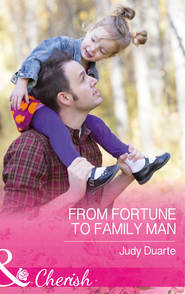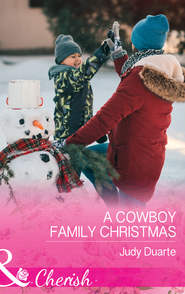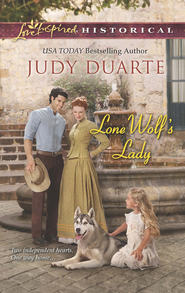По всем вопросам обращайтесь на: info@litportal.ru
(©) 2003-2024.
✖
And Babies Make Five / At Long Last, a Bride: And Babies Make Five
Автор
Год написания книги
2019
Настройки чтения
Размер шрифта
Высота строк
Поля
He walked with her back to the foyer, and as she stepped outside, he closed the door behind them. Then he followed her home.
“Thanks for taking a look,” she said as she led him through her house and into the kitchen, where she’d laid out the samples. If she’d thought his presence had filled the room before, she hadn’t seen anything yet.
He studied the bunny print, then moved on to the fairies and the rest.
“I didn’t ask if you were having a girl or a boy,” he said, “but from the looks of these, I guess it’s a girl.”
“Actually,” she said, skating over the fact that there were three babies and at least one was a boy, “I’d like to keep it generic. And for the record, all baby stuff tends to be sweet and might even seem girly.”
“Okay, then.” He pointed at the farm pattern. “This one is too boyish. I think you should go with the rabbits.”
She looked at the bunny print, then cocked her head to the side. “What’s wrong with the farm pattern? Look at those little ducks and chicks. They’re darling.”
“It has tractors, which isn’t generic. It’s definitely a boy print.”
She crossed her arms, noticing how they rested across the ledge of her tummy these days. “I hope you’re not one of those guys who thinks that little boys always have to be dressed in blue and can’t ever carry a doll. Or that girls can’t play with blocks or trucks.”
“My kids can play with whatever catches their fancy,” he said, “as long as it isn’t dangerous.”
“Your son will get to play with dolls?”
He seemed to ponder that for a moment, then said, “Sure, if he wants to. But I might encourage him to trade them for a teddy bear or stuffed dinosaur instead.”
“Playing with dolls can help a boy learn to be nurturing and gentle,” she said.
“Maybe so. But most kids learn how to behave by watching their parents. And when mommy and daddy show kindness and love toward themselves and others, the kids are more apt to follow suit.”
He had a point, she supposed. Modeling the kinds of behavior and attitudes she wanted her children to have would certainly help. After all, it must work that way, because she’d grown up to be a lot like her mother.
“So tell me,” he said. “Did you play with trucks and cars when you were a little girl?”
“Actually, I played with whatever I could get my hands on—plastic containers my mom kept in cupboards, an old box she brought home from work and I colored to look like a castle. Money was pretty scarce when I was a child. So I learned to be content with what I had.”
His expression shifted from playful to serious. “I just assumed you were a trust-fund baby, like Peter.”
She was now, she supposed, thanks to Peter’s will. But it wasn’t always that way. “Actually, I had partial scholarships to college and worked at the bookstore all four years.”
“No kidding?”
“I wouldn’t joke about something like that.”
He studied her, it seemed. As if he’d suddenly seen something he hadn’t expected to see.
“Does that disappoint you?” she asked, wondering if he’d somehow found her lacking, too. She’d always felt like one of the commoners around her in-laws.
“Why would it?”
Because there were others who’d thought that she hadn’t fit into Peter’s world. But she let that go unsaid and gave a little shrug instead.
“To be honest,” he said, “I’m actually relieved that you’re more down-to-earth than I thought.”
“Why’s that?”
He hesitated. “I wasn’t all that fond of your late husband. And I’m glad to see how different the two of you were. It will make being neighbors a whole lot more pleasant.”
She pulled out a chair, indicated that he should sit there, then took a seat next to him. “Tell me something, Hector. What did you and Peter bump heads over?”
He paused for a moment, as if needing to think over his answer, then said, “Behaviors and attitudes. I suspect our parents modeled two different world views in us, two different sets of values.”
“And you argued?”
“Not exactly. Comments were made. Offense was taken. Bottom line? I guess you could say we just didn’t respect each other and decided to leave well enough alone.”
That surprised her. Peter had always treated people with respect. And other than Hector, she didn’t know anyone who disliked him.
Deciding to drop references to her late husband, she turned back to the wallpaper.
“So you really like the bunnies?”
“Don’t you?”
“Of course. I wouldn’t have brought it home for you to look at if I didn’t.” She offered him a smile.
“Does it matter what I think?”
For some reason, it did. And not just when it came to the nursery.
What would Hector say when she told him there were three babies growing in her womb? And that each of them was carrying half of Peter’s DNA?
And why in the world should it even matter?
After a little more small talk about ducks and chickens, fairies and unicorns, Hector got up to leave.
She almost invited him to stay for dinner, but she didn’t want him to think that she was trying to monopolize his time.
“Thanks for your giving me your opinion,” she said.
“Anytime. If there’s anything that’s a given about me, it’s that you can count on me to have an opinion.”
She smiled as she walked him to the door.
“For what it’s worth,” he said, as he reached for the brass knob, “I actually liked the farm print best.”
“But you said it was boyish.”
“I figured you for bunnies, so I told you what I thought you wanted to hear.”
“Why’s that?”











